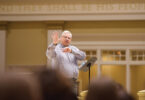Add a few items for the growing number of hungry
by Joe Bollig
joe.bollig@theleaven.org
KANSAS CITY, Kan. — Do you think you don’t know anyone who is hungry? Think again.
The next time you’re at church, look around you. The odds are that one in eight of those around you go hungry. Look at the kids on a school playground. The odds for them are one in five.
These numbers may seem surprising for most people, but this is what her organization has seen, said Ellen Feldhausen, director of communications for Harvesters, the Community Food Network.
“What this means is that everyone knows someone who may be at risk from hunger,” said Feldhausen.
“We may not realize it, [the hungry] may not talk about it, but we all know someone,” she continued. “The people [Harvesters] is helping to feed are our neighbors. They are people we work with, or go to Mass with. They almost certainly are our children’s or grandchildren’s classmates.”
Harvesters is a regional food bank that provides items to other organizations in a 26-countywide area of northwest Missouri and northeastern Kansas. Sixteen of those counties are in Kansas.
“[Harvesters] is feeding as many as 66,000 people a week in our service areas, across our network,” said Feldhausen. “More than one-third of the people we serve are children.”
The situation isn’t going to get better anytime soon, she said. More than two years of a bad economy has produced greater hunger and food insecurity in more households.
“We’re seeing increasing numbers,” said Feldhausen. “Our agencies are seeing a 40 percent increase, consistent over two years since the recession started.”
“While some economic projections predict some things starting to improve, all that I’m reading talk about a jobless recovery,” she continued. “No one is seeing the job rate improving significantly.
“That tells us people will continue to need food assistance.”
Hunger in America is often associated with homelessness, but it shouldn’t be, said Barbara LaClair, chairperson of the Kansas Food Security Task Force, an organization of state and private agencies that address hunger. Hunger is a bigger, largely invisible, problem in society.
“People don’t talk about it openly, for one thing,” said LaClair. “People think, because Kansas is an agricultural state, that we don’t have the problems of hunger and poverty some big cities experience. That’s just not true. Hunger is just as much a problem in Kansas as in any place in the nation.”
According to U.S. Department of Agriculture statistics, the Kansas food insecurity rate is 13.8 percent of the population, and the child food insecurity rate is 20.6 percent, said LaClair.
Food security is access to enough food for all embers of a family to have a healthy lifestyle, according to Feldhausen and LaClair. Food insecurity does not mean that a person or family is always hungry. Rather, there may be times when they run out of food because of low wages or an unexpected expense, like a vehicle or home furnace repair. Many of these people live paycheck to paycheck.
“Many of the families [Harvesters] serve are not destitute or homeless,” said Feldhausen. “At some point during the month, they run out of money, and food becomes the thing they can’t becomes the thing they can’t afford. Forty percent of the people Harvesters serve live in households where at least one person is working.”
Hunger and food insecurity are part of a deeper problem, said LaClair
“We know that the majority of [those facing food insecurities] are working families not able to pay all the bills,” she said. “They have tough choices to make for rent, utilities, transportation and medical costs.”
Catholic Charities of Northeastern Kansas is also seeing more people at its Emergency Assistance Centers, said James Cianciaruso, director of family stabilization.
“We see a large number of persons coming to our pantries to access the basic necessities, which are primarily food-related,” said Cianciaruso. “We’re talking about hunger, but you have to take into consideration such things as toiletries and other things for the well- being of a person.”
Last fiscal year (July 2009 to June 2010), Catholic Charities saw a total of about 33,000 unduplicated persons who were served with emergency assistance requests. But in just the first four months of this fiscal year (since July), Catholic Charities has seen 15,535 unduplicated persons seeking assistance.
Catholic Charities has also seen an increase in the number of people’s first- time use of its pantries. This will likely continue.
“That in and of itself tells us we have some newer clients in need, and it isn’t a representation of chronic poverty,” said Cianciaruso. “This is more of a safety net for persons in need for a shorter period of time. Absolutely, the issue of jobs is a serious situation right now. . . . My expectations are that we’re going to see some higher volumes probably for the next 12 to 18 months.”
If there is a bright spot anywhere in this dark situation, it’s that the parishes and schools of the archdiocese — where Catholic Charities gets the vast majority of its food and toiletries — are extremely generous, he said.
When people donate food and other items to Catholic Charities, they are feeding more than the body.
“What we do at Catholic Charities comes from a foundation of faith,” said Cianciaruso. “We have this opportunity to put our faith into action. What we hope for, when a person comes to our pantry or Emergency Assistance Center, is that they have a sense of hope when they leave and that they are treated with dignity, respect and love.
“It’s not just food we’re giving out.”






